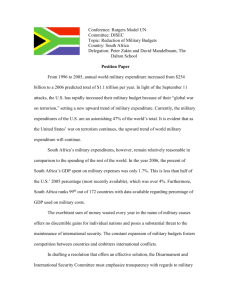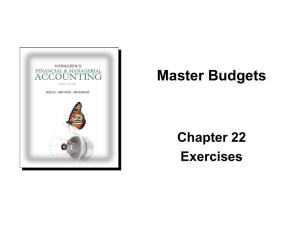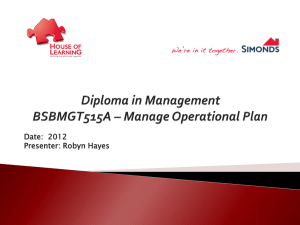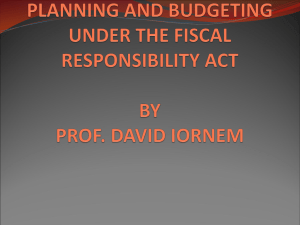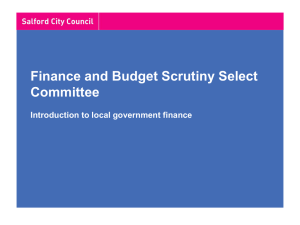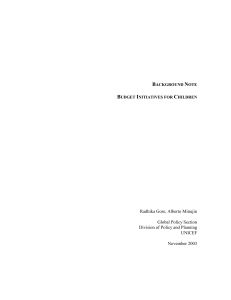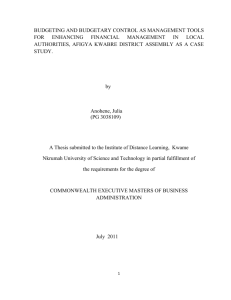Budgetary Planning
advertisement
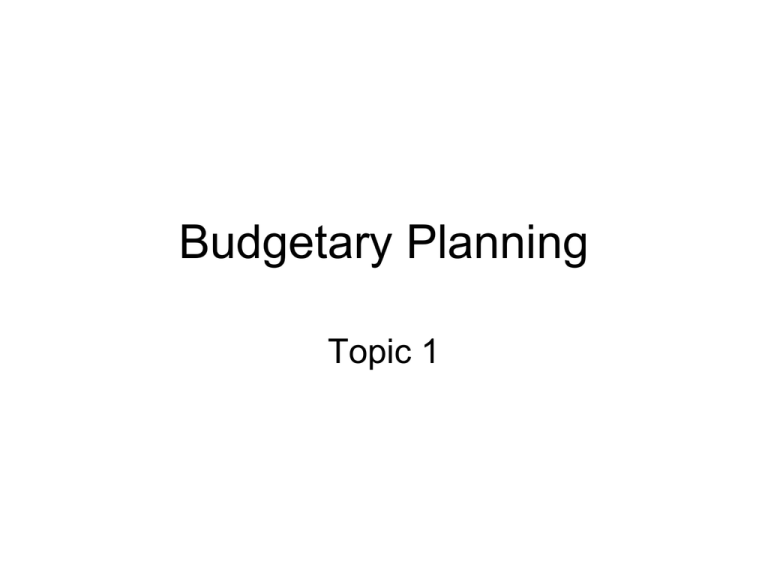
Budgetary Planning Topic 1 Budgeting • The budget is a key financial plan of a business that attempts to forecast a number of months ahead how best to use its resources. • It is a forecast that tries to find out where resources are coming from and where they are being used. • A budget will be made up of different parts, revenue and all the main costs. • This responsibility will be allotted to each function head or the cost accountant/general manager. • Purpose: To control the company’s expenditure • The budget should be communicated to all staff who will be involved in the forward planning of the organisation. Types of Budgets Budget Types • Sales budget • Revenue Expenditure budget • Personnel budget • Capital expenditure budget • Cash budget (Master budget) • Operating budget (profit and loss) Budgetary Planning and Control • When the budget is established it can be used as a control measure and benchmark against what actually happened. • Managers will investigate variances and take corrective action if necessary • The budget may need to be changed if market conditions have changed. Budgetary Control: Managers compare budget to actual, investigate variances and take corrective action. Benefits of Budgeting Planning: requires managers to formulate plans for the future Communication: Aids communication of overall plan to manager, everyone is on the same page Co-ordination: Co-ordinates all budgets to give an overall plan Control: Manager are given responsibility for their results. Senior Manager can monitor results and aids control of costs. Benefits of Budgeting Performance Evaluation: Defines targets for manager and can be used by senior manager to evaluate performance Motivation: Budgets can be used as a motivational tool if manager are rewarded for achieving targets. Will depend on whether manager had input in setting targets and if the budget is seen to be achievable. Budget Setting Process 1. Formation of budget committee: made up of senior managers • Set and approve overall budget objectives • Direct and co-ordinate budget preparation • Arbitration of conflicts and differences • Approval of final budget • Monitor operational activity and review operating results • Approve revisions of budget Budget Setting Process 2. Establish a budget administration system: The committee will appoint a budget manager who will co-ordinate individual departments budgets and ensure consistency 3. Setting the period: what length the budget is for, usually year broken into two or four sections. Budget Setting Process 4. Setting budget guidelines: The guideline is what needs to be achieved from the budget e.g. sales are to increase 5% on last year. The guidelines will be determined by economic climate, market expectations, strategic objectives. All dept must work to these guidelines. Budget Setting Process 5. Preparation of Initial Budget proposal: Each major business segment prepare an initial budget based on guidelines. 6. Negotiation, Review and Approval: Each manager submits a budget this is reviewed by the budget committee. It may need to be tweaked so this is the 'negotiation’ phase. Once all budgets are checked to make sure they are within guidelines, the master budget can be drawn up and approved by committee . Committee then pass it to the board of directors for authorisation. Budget Setting Process 7. Budget Revision: Changes may occur in the market/economy which warrant a change to the budget. For example, if the minimum wage rate went up the budget will be revised and approved by directors. Budget Preparation Process 1. Sales Budget- this is the starting point and the foundation for all other budgets. Shows the unit sales and revenues. 2. Revenue Expenditure Budget: 3. Prepared by operations manager and shows likely day-to-day expenditure. The expenditure will be calculated using information such as number of fitness classes to be held each day/number of staff required per shift. Budget Preparation Process 4. Income Statement budget 5. Capital Expenditure Budget Planned spending on equipment 6. Cash Budget Essential to ensure no cash deficit and if there are they can be planned for. Any excess cash could be put on deposit to earn interest. The cash budget only includes cash movements. Budget Preparation Process 9. Statement of Financial Position Budget 10. Prepare Master Budget Summary of operational budgets into a budgeted income statement. Capital budget, cash budget and budgeted income statement are finalised. Types of Budgets 1. Fixed Budget Budget stays rigid and is compared with actual at end of the period. Flexible Budget Budget may be changed if environmental conditions outside the control of the manager change or capacity could have changed. Types of Budgets 2. Continuous or Rolling Budget The budget is prepared every few months or quarters. When the next period begins the new budget is updated with current/future information. Benefits: Constant budget period is available at all times. Encourages manager to plan and review operations Budgeting and planning becomes more current and up to date. Types of Budgets 3. Zero Based Budgeting: Most budgets are prepared by looking at results from last year and adjusting them. However, zero based budgeting goes back to a zero starting point and builds up the budget from scratch. This is time consuming. Types of Budgets 4. Activity Based Budgeting: Incorporates ABC in to budgeting. Determine the costs for a cost pool based on output. Then design budget around the resources required for each cost pool. Behavioural aspects of budgets: They effect individuals and depending on input of staff they may act as a motivating tool or demotivating. Negative impact of budgets are: - Overemphasis on short term targets - Focus on quantitative factors may overlook qualitative factors - Spend it or lose it Behavioural aspects of budgets • Managers may be tempted to include slack or padding to ensure they wont go over budget. • If bonuses are based on budget targets , sales manager may be tempted to include dubious sales • ‘ Its not in the budget’ – rigid budgets may hinder opportunity • Budget negotiation may lead to company politics. Problems with budgeting -Incremental Budgets : • Inefficiencies are carried forward with little consideration of how to improve • Budget guidelines are often and instructions are often applied universally and not aimed at target areas • Budget process is time consuming, costly and bureaucratic • Companies usually plan on long term future where as budgets are short term


